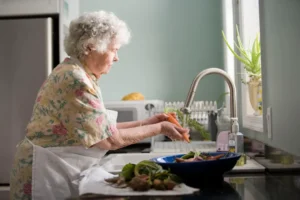Last Updated on 10 months ago by Nicky Johnson
- Seek professional assistance to provide the best care for your elderly family member.
- Create a safe environment to keep them safe.
- Encourage regular exercise and physical activity to help promote healthy aging.
- Provide emotional support and social interaction to give them companionship.
- Monitor their medication use and diet to ensure they get the proper nutrition.
Maintaining normal activities like shopping and housekeeping can be demanding as you age. Family members may even need to help support an elderly loved one with everyday tasks.
Caring for an elderly family member is a big responsibility, but it doesn’t have to be overwhelming. Here are five tips that can help make the process a bit easier.
Seek Professional Assistance When Needed
Blog Contents
When caring for an elderly family member, it is important to recognize when professional assistance might be needed. Depending on the medical and care needs of your loved one, utilizing in-home care can provide significant benefits.
With the help of a trained professional, your senior family members can age in place with more comfort and confidence than if they were left alone.
Professional caregivers are typically trained to assist with daily activities, including bathing, dressing, meal preparation, and light housekeeping.
Create a Safe Environment

It’s important to create a safe environment for the elderly family member you are caring for. Ensure all hallways and rooms are free from clutter, all carpets are secured to the floor, and any staircases have railings on both sides. Install grab bars in the shower and bathtub, and make sure all lights work properly.
Encourage Regular Exercise and Physical Activity
Regular exercise is crucial for elderly individuals, as it helps promote healthy aging and maintain physical strength. Regular physical activity can also help improve the overall quality of life by reducing stress levels and improving flexibility and balance.
Encourage your elderly family member to stay active by walking around the block or participating in gentle yoga classes.
It’s important to provide emotional support for elderly family members. Ensure you give them a sense of companionship and social interaction. This can include taking them to dinner, playing cards or games, or doing an activity together.
Try having meaningful conversations about their life experiences and memories-this can help bring joy and comfort in times of stress.
Monitor Their Medication Use and Diet

As an elderly family member ages, their health needs can change quickly. To ensure that your elderly relative gets the proper nutrition and medication, monitoring their dietary habits and following up with doctors on any drug therapies or supplements they take is important. Make regular check-ins with their physician to ensure that existing medical conditions are under control.
Here are some ways to ensure that you monitor your elderly family members’ health:
Have an Up-to-Date List of Medications
It’s important to keep a list of all the medications your elderly family member is taking, including vitamins and over-the-counter supplements.
This should include information about the dosage, frequency, and any potential side effects they may experience.
Be sure always to review this with their doctor so you can make sure they’re taking the best medications for their age and health condition.
Monitor Dietary Habits
Nutrition plays an important role in the health of any elderly family member. Observe their eating habits and discuss healthy alternatives with them if needed.
Talk to their doctor or dietitian about changes that could improve their health, such as switching from red meat to fish or adding more fresh fruits and vegetables to their meals.
Make Regular Doctor Appointments
Regular visits to the doctor are essential for maintaining an elderly family member’s health, as their condition may change over time.
Ask your relative’s physician what type of follow-up appointments they should have and set up reminders for yourself when they’re due.
You can also look into programs in your area that provide home health care services, which may be easier for the elderly person to access.
Know the Signs of Drug Interactions
Watch out for any changes in behavior that could indicate a drug interaction or other adverse reaction to the medication. Common signs include confusion, dizziness, fatigue, and pain symptoms.
If you notice any of these associated with the medications your elderly family member is taking, contact their doctor immediately.
It’s also important to be aware of potential food-drug interactions if certain foods are eaten in combination with certain medications. Ask their doctor which dietary restrictions they should avoid.
In Summary
Caring for an elderly family member can be difficult, but it is also a rewarding experience. By following these five tips, you can help provide the physical and emotional support your elderly relatives need to maintain their health and well-being. With proper care, you can ensure your elderly loved one is in good hands.







